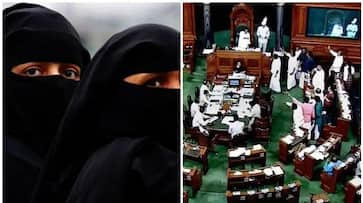The fresh Triple Talaq Bill intends to make the practice of instant triple talaq among Muslims an offence under the Indian Penal Code (IPC) with the provision of three-year jail for the husband
New Delhi: The Lok Sabha will take up The Muslim Women (Protection of Rights on Marriage) Bill, 2018 on Thursday for consideration and passing.
Union law minister Ravi Shankar Prasad will move the Bill, which aims at "protecting the rights of married Muslim women and prohibiting divorce by pronouncing talaq by their husbands and to provide for matters connected therewith or incidental thereto, be taken into consideration."

The Bharatiya Janata Party (BJP) had on Tuesday issued a whip to all its Lok Sabha MPs to pass the contentious triple talaq bill.
With enough numbers on its side, the BJP expects the bill to sail through the Lok Sabha test. The ruling party has 271 members in the lower House.
Here’s 7 need to know about the Bill

- The fresh Triple Talaq Bill intends to make the practice of instant triple talaq among Muslims an offence under the Indian Penal Code (IPC) with the provision of three-year jail for the husband.
- The Bill, earlier introduced in the Lok Sabha on December 17, will replace the ordinance issued by the Central government in September this year, banning the instant triple talaq.
- The instant triple talaq was taken up in the Parliament in August last year after a five-judge bench of the Supreme Court ruled unconstitutional a law that allowed Muslim men to divorce their wives simply by uttering 'talaq' three times in quick succession.
- In the landmark 3-2 verdict, the apex court found the practice un-Islamic and "arbitrary", and disagreed that triple talaq was an integral part of religious practice.

- The Opposition was against the criminalisation of triple talaq, arguing that it will be a disservice to Muslim women.
- The Congress and other parties contend that a divorce by triple talaq is, as such, null and void now — due to the Supreme Court order, and so no further legislation to make the act a criminal offence is needed.
- Prime Minister Narendra Modi has time and again asserted that the BJP is committed to passing this legislation to ‘empower’ Muslim women.
With agency inputs
Last Updated Dec 27, 2018, 4:25 PM IST









![Salman Khan sets stage on fire for Anant Ambani, Radhika Merchant pre-wedding festivities [WATCH] ATG](https://static-gi.asianetnews.com/images/01hr1hh8y86gvb4kbqgnyhc0w0/whatsapp-image-2024-03-03-at-12-24-37-pm_100x60xt.jpg)
![Pregnant Deepika Padukone dances with Ranveer Singh at Anant Ambani, Radhika Merchant pre-wedding bash [WATCH] ATG](https://static-gi.asianetnews.com/images/01hr1ffyd3nzqzgm6ba0k87vr8/whatsapp-image-2024-03-03-at-11-45-35-am_100x60xt.jpg)


